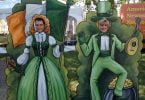by Anita McSorley
anita.mcsorley@theleaven.org
Ordination. Transubstantiation. Offer it up.
When I first started writing for The Leaven many years ago, almost every reader of The Leaven would have known instantly what each of these phrases meant.
Likewise, in the larger society, American writers thought they could safely rely on the fact that there was a certain commonality to their readers’ experiences, their corporate knowledge.
A guy named E. D. Hirsch even wrote a book on it, called “Cultural Literacy: What Every American Needs to Know.”
It wasn’t always this way, of course — that we were so homogeneous that a single book could codify all requisite knowledge needed to be a bona fide informed U.S. citizen.
In fact, when the digital revolution came along, we learned that it was really never that way — that, indeed, Shakespeare was right when he said there were “more things in heaven and earth” than we’d dreamt of in our philosophies. It only appeared that way because all of us writing for a living had agreed on roughly the same definition of this mythic “informed citizen” and a shared understanding of what we could assume he or she would understand.
I’m boring you with all this because I just came back from our national press convention, which was held in St. Louis this year.
And if there was any theme that prevailed at the convention, it was “Don’t assume anything about your readers anymore.”
By that I mean, for a start, don’t assume that they are going to have any interest in the “insider baseball” that we church groupies enjoy.
The fact that four congregations instead of just one are now charged with investigating bishops negligent in their handling of clerical sexual abuse fascinates only we overinvested — and sometimes overwrought! — few.
But that’s not all.
We can also no longer assume that our readers will find our stories in the paper we mail into the homes of 51,000 Catholic families each month. Nor can we assume that wherever they find us, they will read what we tell them is important to read.
They will decide for themselves what is important.
And they’ll read it — if they get around to it.
We can’t assume, moreover, that they share the lexicon of Catholic terms that most Catholics shared — to a larger extent, anyway — 30 years ago.
We can’t even trust that our readers are readers at all! Perhaps they will learn of our stories only through our photographs, videos, or podcasts.
You might think that such a convention would be dispiriting at best.
But you would be wrong.
There is something very elemental about what we do here at The Leaven.
We do something that has been done as long as men have walked this earth.
We tell stories.
So the fact that technology has now made it possible to tell those stories through not only type, but through images, music and sound, and we’re still able to package them up and throw them out to you — as well as into the wide and wonderful world beyond — is incredibly liberating.
Ok, terrifying. But liberating, too.
So as we move forward into this new and wider big, blue yonder with even more challenges before us, please help us spread the word.
Visit our website, follow us on Facebook, and join us in our efforts to tell our stories.
Well, actually, your stories.
Well, actually, His story.






